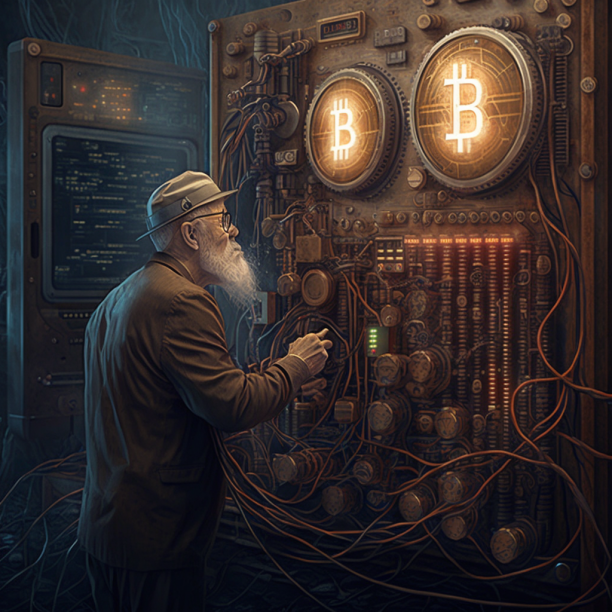Bitcoin 101: Exploring the Fascinating World of Digital Currency and the Blockchain
1. Here's An Interesting Take On What Bitcoin Is:
Picture this: You're in a crowded room, and someone hands you a piece of paper with a string of numbers and letters on it. "Congratulations," they say. "You now have a digital currency worth thousands of dollars."Sounds too good to be true, right? But this is the essence of Bitcoin. It's a digital currency, but unlike traditional money, it's not backed by any government or financial institution. Instead, it's decentralized and operates on a peer-to-peer network.
Think of it like a digital version of gold. Just like gold, Bitcoin has a finite supply (only 21 million will ever be created), and it's impossible to create more out of thin air. This means that unlike traditional currencies, which can be devalued through inflation, Bitcoin's value is based purely on supply and demand.
But here's the kicker: Bitcoin isn't just a currency. It's also a technology. The underlying technology that powers Bitcoin is called the blockchain, and it's a decentralized ledger that records every single transaction ever made using Bitcoin.
This means that not only can Bitcoin be used as a currency, but it also has the potential to revolutionize industries like finance, real estate, and even voting. By using the blockchain, transactions can be made faster, cheaper, and more securely than ever before.
So, to sum it up: Bitcoin is a digital currency that operates on a decentralized network and is powered by the blockchain. It's finite in supply and has the potential to revolutionize industries beyond just finance. And who knows? Maybe one day, you'll be the lucky person in a crowded room who's handed a piece of paper with thousands of dollars worth of Bitcoin on it.
2. Let's Dive A Bit Deeper Into What Bitcoin Is And How It Works.
At its core, Bitcoin is a form of digital money that allows people to transact with one another without the need for a middleman like a bank or payment processor. Instead, transactions are validated and recorded on a decentralized ledger called the blockchain.
When someone sends Bitcoin to another person, the transaction is broadcast to a network of computers around the world. These computers, called nodes, work together to validate the transaction and add it to the blockchain.
Once the transaction is added to the blockchain, it's immutable, meaning that it can't be altered or deleted. This makes the blockchain a secure and reliable way to record transactions without the need for a central authority.
To ensure the security and integrity of the network, Bitcoin uses a mechanism called proof-of-work (PoW). PoW is a way of solving complex mathematical puzzles that requires a lot of computing power. Miners, who are individuals or groups of people that dedicate their computers to solving these puzzles, are rewarded with new Bitcoin for their efforts.
Because of the finite supply of Bitcoin, the reward for mining new blocks is halved every 210,000 blocks. This means that over time, it will become harder and harder to mine new Bitcoin.
But why does Bitcoin have value? Like any other currency, Bitcoin's value is based on supply and demand. People are willing to pay for Bitcoin because they believe it has value and can be used to buy goods and services, just like traditional money.
So, to sum it up: Bitcoin is a form of digital money that operates on a decentralized network called the blockchain. Transactions are validated and recorded by a network of nodes using a mechanism called proof-of-work. Bitcoin has value because people are willing to pay for it, and it can be used to buy goods and services just like traditional money.
3. Here Are A Few More Interesting Facts About Bitcoin:
Bitcoin was created in 2009 by an anonymous person or group using the pseudonym Satoshi Nakamoto. The true identity of Satoshi Nakamoto remains a mystery to this day.
The maximum number of Bitcoin that can ever exist is 21 million. As of March 2023, over 19.32 million Bitcoin have already been mined.
Bitcoin's price can be incredibly volatile. In 2017, the price of Bitcoin soared to nearly $20,000 before crashing back down to around $3,000 in 2018. Since then, the price has fluctuated wildly, reaching a high of over $60,000 in 2021 before dropping back down to around $30,000.
While Bitcoin is the most well-known cryptocurrency, there are thousands of other cryptocurrencies in existence. These are often referred to as "altcoins."
Some businesses and individuals are now accepting Bitcoin as a form of payment. For example, you can use Bitcoin to buy a Tesla car or book a hotel room on Expedia.
Because Bitcoin operates on a decentralized network, it's often seen as a way to protect against government overreach or financial instability. In some countries, like Venezuela and Zimbabwe, where the local currency has been devalued due to economic instability, Bitcoin has become a popular way to store and transfer wealth.
While Bitcoin transactions are relatively anonymous, they're not completely untraceable. Transactions are recorded on the blockchain, which means that anyone can see the amounts and addresses involved in a transaction. However, it's difficult to link a specific address to a particular individual unless they reveal their identity.
Overall, Bitcoin is a fascinating technology that has the potential to revolutionize the way we think about money and finance. While it's still relatively new and there are many uncertainties around its future, it's clear that Bitcoin has already made a significant impact on the world of finance and technology.
By Vishal Solomon







Comments
Post a Comment